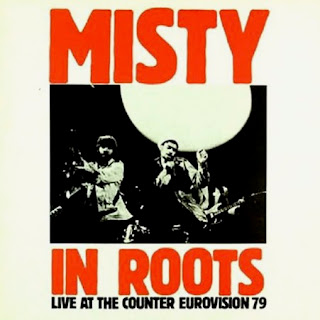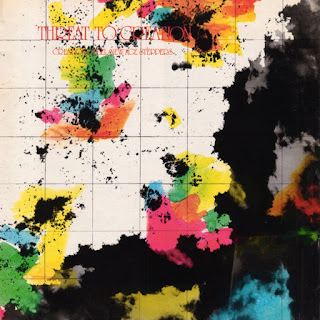Prompted by one of those Facebook memes going around while we are all trapped in Coronavirus lockdown, I have started thinking about the records that most influenced the evolution of my musical taste. Here's the first instalment, in a not completely chronological order:
Misty in Roots - Live at the Counter Eurovision 79 I could have chosen any number of reggae records to start this list off - I'd been listening to reggae pretty much exclusively since 1976 (at the age of 15) with a bit of punk beginning to intrude as time went by. I've included Misty in Roots Live at the Counter Eurovision not only because it is one of my favourite roots reggae records, but also because it's one of the best live concert recordings of any genre. Famously when it was first released the DJ John Peel devoted an entire radio show to the record, simply playing the whole LP twice over because he liked it so much. It starts with the immortal words "When we trod this land, we walk for one reason. The reason is to try to help another man to think for himself. The music of our hearts is roots music: music which recalls history, because without the knowledge of your history, you cannot determine your destiny; the music about the present, because if you are not conscious of the present, you are like a cabbage in this society; music which tells about the future and the judgement which is to come."
Creation Rebel & New Age Steppers - Threat to Creation By late 1979 an interesting strand of music had emerged in the UK - the meeting of reggae and punk, championed by eg: the Clash, but also by producer Adrian Sherwood and his ON-U Sound label. Adrian was making heavy heavy dub music, getting even more psychedelic than the Jamaican producers. I was at university at the time, living my life to a permanent backdrop of far out dub, the bass shaking my bones, and the tunes twisting my mind. Possibly the heaviest of all the records, and one of those I listened to most, was this 1981 ON-U Sound release Threat to Creation by Creation Rebel and New Age Steppers. Have a listen to the track "Chemical Specialist" and you will see what I mean.
The Pop Group - Y In early 1980 I went to Bristol to hear Creation Rebel play. At the same concert was the Pop Group, who had released their record "Y" the year before. I'd never heard music like it - I'm not sure many other people had either - it's an extraordinary combination of funk, punk and chaos, produced by the reggae dub master Dennis Bovell. The Pop Group were touring southern England - so I skipped a few weeks of university and just followed them around going to all their gigs and buying them drinks afterwards. Listening to "Y" in 2020 is still amazing, it's as though the record had been made this year. This is music that does not age - a strong candidate for the best pop record of all time.
Public Image Limited - Metal Box After the Sex Pistols split up, John Lydon (Johnny Rotten as was) formed Public Image Limited, or PiL for short. Metal Box (1979) was their second release - three 12 inch singles in a film canister stamped with the logo PiL. With Keith Levene's scratching metal guitar on top and the momentum of Jah Wobble's thunderous baselines below, this record reinvented (for me at least, but I think for many others too) dance music as something dark and dubby. The years have not aged it. Listening to it now is still like listening to music from the future.
Killing Joke - Killing Joke released in 1980, the first broadly Rock genre LP that I ever owned or liked. I had spent the second half of the seventies at a British boys' boarding school being forced to overhear the musical manifestation of everyone else's teenage angst - which was somehow entirely guitar based white rock music (Genesis, Yes, Deep Purple, King Crimson, Black Sabbath, Led Zep etc) while all I wanted to hear was reggae and soul, although I guess we began to find more common ground in punk music. Fortunately I had headphones. Anyway, hearing Killing Joke was a bit of a revelation. And possibly one of the best ever record covers.
Steve Reich - Music for 18 Musicians The German label ECM released Steve Reich's Music for 18 Musicians in 1978. I bought a copy in 1979 because I liked the cover, but didn't actually listen to it until 1983, when I was first living in Germany. Contemporary classical music hadn't grabbed me as a concept before, but when I did listen to it what I heard in the music was the same as what I heard in dub reggae, the concepts of repetition and change playing together to make beautiful shapes in my mind. I grew also to love the contemplative aspect of the long form piece - it's a single piece 56 minutes long. Many years later I had the pleasure of meeting Steve Reich a few times. He told me when he wrote Music for 18 Musicians he thought he was creating something new and radical, but with the perspective of age he's realised it has more in common with Bach's fugues. It may or may not be true that there were more performers than people in the audience for the 1976 world premiere in New York, but since then it has become one of the most popular pieces of contemporary classical music, and one that people want to talk to him about the most. Which is rather to ignore the amazing music Steve Reich has gone on to compose in the 40 years since then.
J.S.Bach - Brandenburg Concerto My other entry into the world of classical music was this recording of Bach's Brandenburg Concerto from maybe 1970. I had a copy in my car via my mother. For lack of anything else to listen to on a motorway journey in 1981 I put this cassette on. After about 20 minutes I had to stop the car and just listen, so strong was my response. It's played at a fast tempo, and has all the consequent joy of upbeat pop music. Interestingly this particular recording has only ever been released on cassette- there's not digital version anywhere (I have looked quite hard). I've also often wondered if concertos 2, 3 and 5 were recorded at the same time!







No comments:
Post a Comment